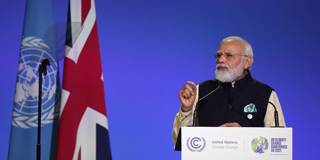It is easy to see why climate activists would dismiss international negotiations like the recent COP26 climate summit as mere jawboning. But in a world of geopolitical rivalries and significant coordination challenges, compromise – and the disappointment that can come with it – is a fact of life.
BARCELONA – “Blah, blah, blah.” That was how the young climate activist Greta Thunberg characterized this year’s climate summit in Glasgow (COP26) – even before it began. She was right, in a way. Talk is cheap whenever international agreements lack effective mechanisms to verify and enforce commitments. Gatherings like COP26 tend to lack credibility, even when they are presented as a “last chance” to prevent the end of the world as we know it. Nonetheless, such meetings help to raise awareness about the problem and potential solutions, and that is better than the denialism of past years.
True, the final agreement produced at COP26 appears weak, considering that the goal of keeping global warming below 1.5º Celsius is now barely alive. Instead of “unabated coal power” being phased out, now it will be “phased down,” a crucial change inserted at India’s insistence (and with China’s acquiescence). While “inefficient fossil-fuels subsidies” will still be “phased out,” the implication is that “efficient” fossil-fuel subsidies remain an option.
But, remember, talk is cheap. Given India’s high dependence on coal, it is perhaps better that it has set its net-zero emissions target for 2070 rather than proclaiming a “mid-century” commitment that is has no intention of upholding.

BARCELONA – “Blah, blah, blah.” That was how the young climate activist Greta Thunberg characterized this year’s climate summit in Glasgow (COP26) – even before it began. She was right, in a way. Talk is cheap whenever international agreements lack effective mechanisms to verify and enforce commitments. Gatherings like COP26 tend to lack credibility, even when they are presented as a “last chance” to prevent the end of the world as we know it. Nonetheless, such meetings help to raise awareness about the problem and potential solutions, and that is better than the denialism of past years.
True, the final agreement produced at COP26 appears weak, considering that the goal of keeping global warming below 1.5º Celsius is now barely alive. Instead of “unabated coal power” being phased out, now it will be “phased down,” a crucial change inserted at India’s insistence (and with China’s acquiescence). While “inefficient fossil-fuels subsidies” will still be “phased out,” the implication is that “efficient” fossil-fuel subsidies remain an option.
But, remember, talk is cheap. Given India’s high dependence on coal, it is perhaps better that it has set its net-zero emissions target for 2070 rather than proclaiming a “mid-century” commitment that is has no intention of upholding.